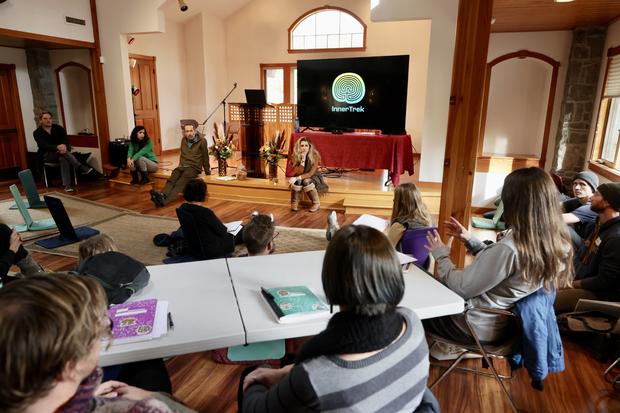▶ Watch Video: New hope in treating PTSD with psychedelic drugs
In the last few weeks, dozens of students have graduated from schools in Oregon where they were trained to guide people through magic mushroom trips that can last as long as six hours. At one school, an alpaca farmer, a social worker, an ER nurse and a nutritionist were all in the same class, attempting to learn the tricks of a new trade.
But it will be a few months until any of them can legally practice what they’ve learned in their state — and once they can, there are open questions about how the psychedelics industry will shape up there.
“Our big mantra to students is, don’t quit your day job,” said Nathan Howard, the director of one facilitator school called InnerTrek, adding, “Yet.”
The Oregon state government and 22 training schools are writing the rule book on the best strategy for administering a drug that has shown promise in clinical trials in combatting depression, addiction or dependencies, and anxiety around terminal illnesses.
The first licensed magic mushroom guides could be a model for a new sort of health care professional — but are they ready for the realities of the work and how much of a risk are the new guides taking on?
In November 2020, Oregon voters became the first in the country to approve therapeutic use of psilocybin, which is the key ingredient in magic mushrooms. The drug became legal Jan. 1, 2023, though actual sale of the psychedelic can’t begin until the state gives its stamp of approval to laboratories which will produce the psilocybin products and service centers where they’ll be consumed. Unlike cannabis, magic mushrooms won’t be sold at dispensaries and can only be used under supervision at licensed locations.
By state law, the supervisors or psilocybin facilitators have to be over 21, have a minimum of a high school education, and they must graduate from a training school before they take a licensing exam. Beyond that, the state entrusts school administrators to vet people through the application process and to iron out the specifics of what a day on the job might entail.
Dozens of hours of practice or “role-playing” sessions are a key part of the schooling, but the first prospective magic mushroom facilitators ran most mock sessions on one another without actually using psilocybin. Since there were no state-approved service centers ready to host magic mushroom trips, schools found strategies to imitate the “altered” mental state for the first trainees. InnerTrek gave students the option of using ketamine or deep-breathing techniques when playing the role of a client during class.
 Students attend class at InnerTrek, a school for psilocybin facilitators in Oregon.
Students attend class at InnerTrek, a school for psilocybin facilitators in Oregon.
Nathan Howard / InnerTrek
Among other issues, the practice sessions helped students think through what it might really look and feel like to comfort a client in emotional distress. Oregon allows therapeutic touch during a session with the psychedelic, which can temporarily affect people’s emotions and perceptions. Under state measure 109, as it’s called, facilitators are permitted to offer a hug or touch a client’s shoulder, hand or foot.
“That’s part of our role-playing,” said Lisa Ginzburg, the founder of Changa Institute, a school for psilocybin guides. “How do you know when to offer a hug? How do you offer a hug? What if you’re not feeling like you want to offer a hug?”
In terms of the economic future of facilitators, training centers can offer fewer details. Students invest $8,000 or more when they enroll in training programs that take about three months to six months to complete. At InnerTrek, Howard estimates their graduates could be making anywhere from $40,000 to $160,000 a year “as the marketplace matures,” depending on who they serve and how often they practice. Some people might want to see no more than two clients a week to avoid burnout from work that can be mentally and even physically draining, Howard said.
“When I was facilitating for an amazing transgender therapist I had to carry them outside,” Howard said. “They wanted me to hold them for about two hours.”
For an individual experience with magic mushrooms, the starting cost could range from $1,500 to $3,000 according to Dave Naftalin, one of the first three licensed facilitators in the state, who plans to open his own service centers. Naftalin, the CEO of a psilocybin start-up called DropThesis, jumped into the industry in part because of his own experiences using magic mushrooms to process grief.
“I lost a bunch of friends right after high school from very unique and unexplained circumstances in a row,” said Naftalin. “And because I was really struggling, I had my experience. And after that, I felt at peace and I wasn’t spinning anymore.”
Former social worker Jeannette Small, another newly licensed graduate who hopes to open her own center, understands her clients will have higher incomes than the people she enjoyed helping for much of her career.
“Business has to be sustainable, even if we want to offer sessions at a lower price,” Small said.
The specter of legal liability hangs over the new facilitators. Psilocybin is still listed as an illegal Schedule I drug nationally, so Oregon is in a regulatory clash with the federal government.
Dr. Kevin Sabet, a former drug policy adviser to Democratic and Republican White Houses, says he sees a “huge” liability risk for magic mushroom supervisors.
“They’re going to have to get big insurance policies, or maybe they’re just going to roll the dice,” said Sabet, the CEO of the Foundation for Drug Policy Solutions. “But this isn’t like smoking a joint and falling asleep. It has potentially a profoundly negative effect if you have a bad trip.”
Magic mushrooms could be dangerous for those with cardiovascular conditions since they increase people’s heart rate, and there are questions about whether the psychedelic is safe for people with a history of bipolar disorder, according to Dr. Greg Fonzo, the co-director of the Center for Psychedelic Research and Therapy at the University of Texas. But psilocybin poses little risk of overdose or addiction to users.
“We do know is that it’s relatively safe for a large number of folks,” Fonzo said.
Facilitators like Small might be able to supervise mushroom trips as early as this summer, according to state projections.
“Even a lot of highly functional people, they feel unfulfilled and disconnected and isolated and stuck. And this is such a wonderful opportunity to help. It is worth the gamble,” Small said.







